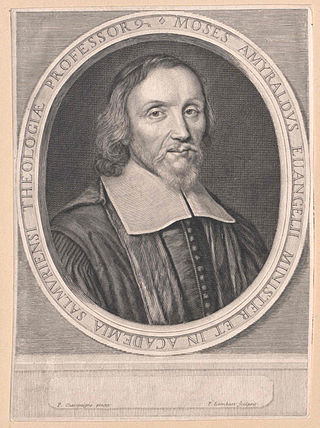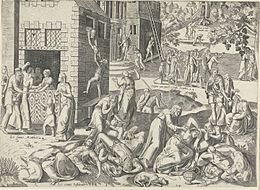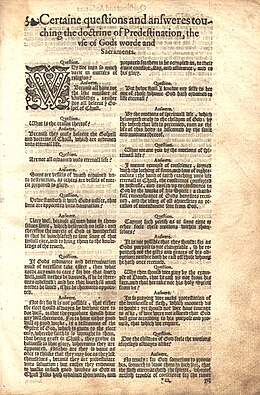
Arminianism is a movement of Protestantism initiated in the early 17th century, based on the theological ideas of the Dutch Reformed theologian Jacobus Arminius and his historic supporters known as Remonstrants. Dutch Arminianism was originally articulated in the Remonstrance (1610), a theological statement submitted to the States General of the Netherlands. This expressed an attempt to moderate the doctrines of Calvinism related to its interpretation of predestination.

Reformed Christianity, also called Calvinism, is a major branch of Protestantism that began during the sixteenth-century Protestant Reformation, a schism in the Western Church. Today, it is largely represented by the Continental, Presbyterian, and Congregational traditions, as well as parts of the Anglican and Baptist traditions.

Predestination, in theology, is the doctrine that all events have been willed by God, usually with reference to the eventual fate of the individual soul. Explanations of predestination often seek to address the paradox of free will, whereby God's omniscience seems incompatible with human free will. In this usage, predestination can be regarded as a form of religious determinism; and usually predeterminism, also known as theological determinism.

Perseverance of the saints is a Christian teaching that asserts that once a person is truly "born of God" or "regenerated" by the indwelling of the Holy Spirit, they will continue doing good works and believing in God until the end of their life.

In Western Christian theology, grace is created by God who gives it as help to one because God desires one to have it, not necessarily because of anything one has done to earn it. It is understood by Western Christians to be a spontaneous gift from God to people – "generous, free and totally unexpected and undeserved" – that takes the form of divine favor, love, clemency, and a share in the divine life of God. In the Eastern Orthodox Church, grace is the uncreated Energies of God. Among Eastern Christians generally, grace is considered to be the partaking of the Divine Nature described in 2 Peter 1:4 and grace is the working of God himself, not a created substance of any kind that can be treated like a commodity.

In Christian theology, synergism is the belief that salvation involves some form of cooperation between divine grace and human freedom. Synergism is upheld by the Catholic Church, Eastern Orthodox Churches, Oriental Orthodox Churches, Anabaptist Churches and Methodist Churches. It is an integral part of Arminian theology common in the General Baptist and Methodist traditions.

Unconditional election is a Calvinist doctrine relating to predestination that describes the actions and motives of God prior to his creation of the world, when he predestined some people to receive salvation, the elect, and the rest he left to continue in their sins and receive the just punishment, eternal damnation, for their transgressions of God's law as outlined in the Old and New Testaments of the Bible. God made these choices according to his own purposes apart from any conditions or qualities related to those persons.

Limited atonement is a doctrine accepted in some Christian theological traditions. It is particularly associated with the Reformed tradition and is one of the five points of Calvinism. The doctrine states that though the death of Jesus Christ is sufficient to atone for the sins of the whole world, it was the intention of God the Father that the atonement of Christ's death would work itself out in only the elect, thereby leading them without fail to salvation. According to Limited Atonement, Christ died for the sins of the elect alone, and no atonement was provided for the reprobate. This is in contrast to a belief that God's prevenient grace enables all to respond to the salvation offered by God in Jesus Christ Acts 2:21 so that it is each person's decision and response to God's grace that determines whether Christ's atonement will be effective to that individual. A modified form of the doctrine also exists in Molinism.

Irresistible grace is a doctrine in Christian theology particularly associated with Calvinism, which teaches that the saving grace of God is effectually applied to those whom he has determined to save and, in God's timing, overcomes their resistance to obeying the call of the gospel, bringing them to faith in Christ. It is to be distinguished from prevenient grace, particularly associated with Arminianism, which teaches that the offer of salvation through grace does not act irresistibly in a purely cause-effect, deterministic method, but rather in an influence-and-response fashion that can be both freely accepted and freely denied.
Reprobation, in Christian theology, is a doctrine which teaches that a person can reject the gospel to a point where God in turn rejects them and curses their conscience. The English word reprobate is from the Latin root probare, which gives the Latin participle reprobatus, the opposite of approbatus. The doctrine is first found in Jeremiah 6:30, but also found in many passages of scripture such as Romans 1:20-28, 2 Corinthians 13:5-6, Proverbs 1:23-33, John 12:37-41, and Hebrews 6:4-8.
Prevenient grace is a Christian theological concept that refers to the grace of God in a person's life which precedes and prepares to conversion. The concept was first developed by Augustine of Hippo (354–430), was affirmed by the Second Council of Orange (529) and has become part of Catholic theology. It is also present in Reformed theology, through the form of an effectual calling leading some individuals irresistibly to salvation. It is also in Arminian theology, according to which it is dispensed universally in order to enable people to respond to the offer of salvation, though it does not ensure personal acceptance.

As a general term in theological use, assurance refers to a believer's confidence in God, God's response to prayer, and the hope of eternal salvation. In Protestant Christian doctrine, the term "assurance", also known as the Witness of the Spirit, affirms that the inner witness of the Holy Spirit allows the Christian disciple to know that they are justified. Based on the writings of St. Augustine of Hippo, assurance was historically an important doctrine in Lutheranism and Calvinism, and remains a distinguishing doctrine of Methodism and Quakerism, although there are differences among these Christian traditions. Hymns that celebrate the witness of the Holy Spirit, such as "Blessed Assurance" are sung in Christian liturgies to celebrate the belief in assurance.
The Five Points of Calvinism, occasionally known by the mnemonic TULIP, constitute a summary of Reformed soteriology. Named after John Calvin, they largely reflect the teaching of the Canons of Dort. The Five Points of Calvinism assert that God saves every person upon whom he has mercy, and that his efforts are not frustrated by the unrighteousness or inability of humans. They have been summarized under the acrostic TULIP: total depravity, unconditional election, limited atonement, irresistible grace, and the perseverance of the saints.
Eternal security, also known as "once saved, always saved" is the belief providing Christian believers with absolute assurance throughout their lives of their inevitable salvation. The term has been also used as a synonym for doctrines that offer theoretical security to the elect, although not guaranteeing absolute assurance to all believers. Throughout its historical development and theological influences, diverse interpretations have emerged, especially in relation with the defining aspects of theological determinism and libertarianism, as well as the importance of perseverance.

Amyraldism is a Calvinist doctrine. It is also known as the School of Saumur, post redemptionism, moderate Calvinism, or hypothetical universalism. It is one of several hypothetical universalist systems.
Reformed theology studies the logical order of God's decree to ordain the fall of man in relation to his decree to save some sinners through election and condemn others through reprobation. Several opposing positions have been proposed, all of which have names with the Latin root lapsus, and the word stem -lapsarianism.

The history of the Calvinist–Arminian debate begins in early 17th century in the Netherlands with a Christian theological dispute between the followers of John Calvin and Jacobus Arminius, and continues today among some Protestants, particularly evangelicals. The debate centers around soteriology, or the study of salvation, and includes disputes about total depravity, predestination, and atonement. While the debate was given its Calvinist–Arminian form in the 17th century, issues central to the debate have been discussed in Christianity in some form since Augustine of Hippo's disputes with the Pelagians in the 5th century.
The Lambeth Articles of 1595 were a series of nine doctrinal statements intended to be an appendix to the Thirty-nine Articles of the Church of England. In response to a controversy over the Calvinist doctrine of predestination, the Lambeth Articles were created to clarify the church's official teaching. Because Queen Elizabeth I refused to authorise the articles, they never went into effect in England. However, they were adopted by the Church of Ireland in 1615.

Sovereignty of God in Christianity can be defined as the right of God to exercise his ruling power over his creation. Sovereignty can include also the way God exercises his ruling power. However this aspect is subject to divergences notably related to the concept of God's self-imposed limitations. The correlation between God's sovereignty and human free will is a crucial theme in discussions about the meaningful nature of human choice.

Augustinian Calvinism is a term used to emphasize the alleged origin of John Calvin's theology within Augustine of Hippo's theology over a thousand years earlier. By his own admission, John Calvin's theology was deeply influenced by Augustine of Hippo, the fourth-century church father. Twentieth-century Reformed theologian B. B. Warfield said, "The system of doctrine taught by Calvin is just the Augustinianism common to the whole body of the Reformers." Paul Helm, a well-known Reformed theologian, used the term "Augustinian Calvinism" for his view in the article "The Augustinian-Calvinist View" in Divine Foreknowledge: Four Views.













